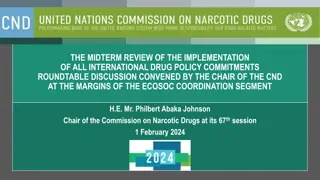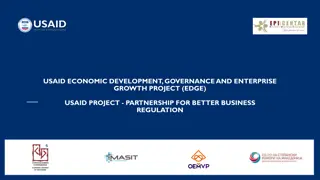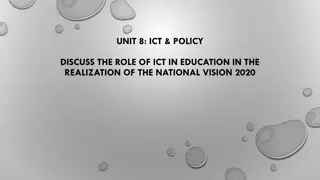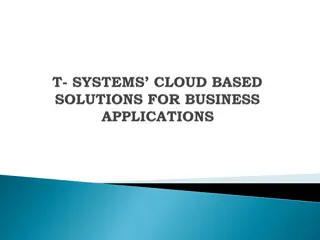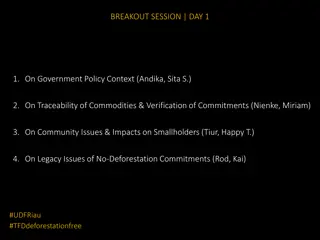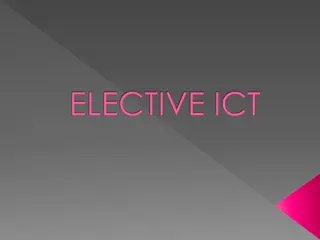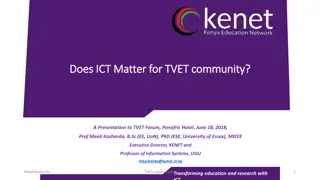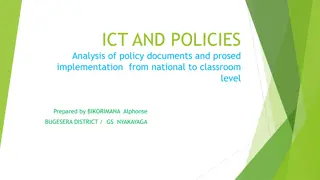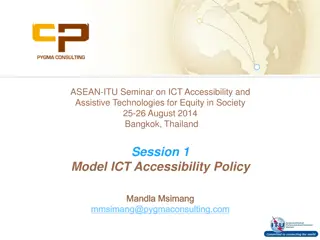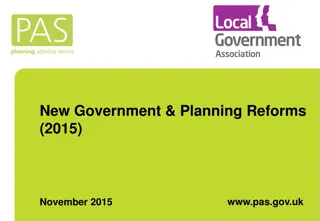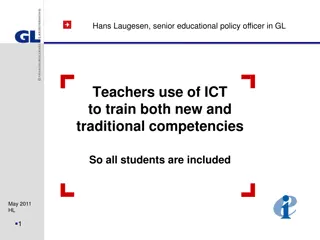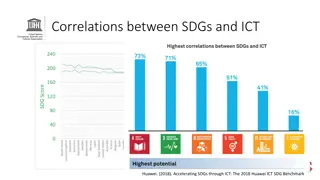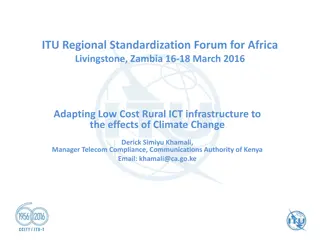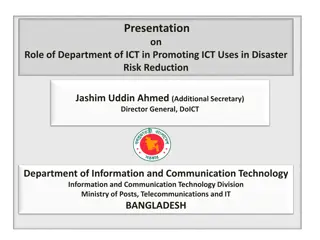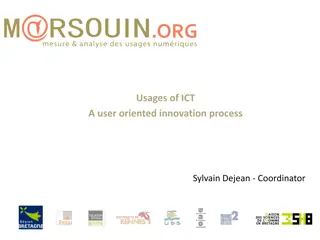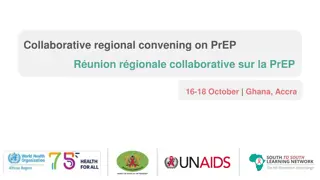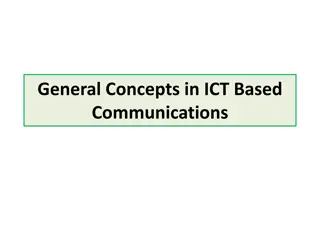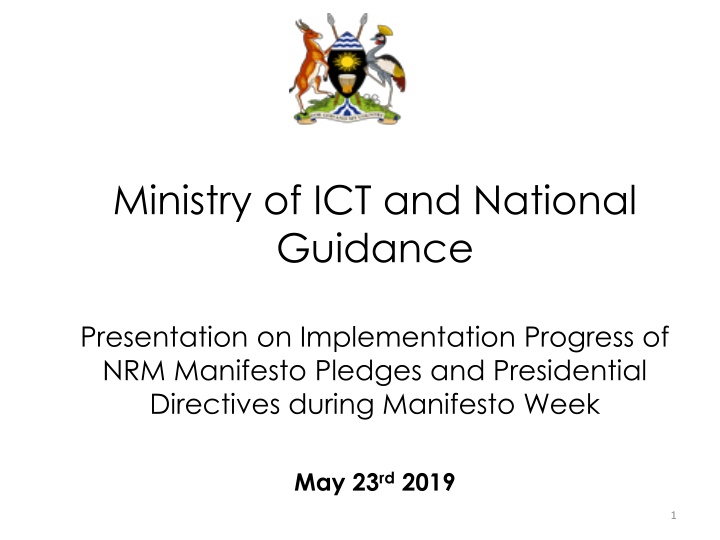
ICT and National Guidance Sector Achievements and Progress Report
"Explore the progress and achievements of the ICT & National Guidance sector in Uganda, including infrastructure development, policy enactment, and increased citizen participation. Discover key milestones such as the National Broadband Policy approval, Data Protection Act enactment, and initiatives to enhance digital connectivity and education. Gain insights into challenges and future goals for this vital sector."
Download Presentation

Please find below an Image/Link to download the presentation.
The content on the website is provided AS IS for your information and personal use only. It may not be sold, licensed, or shared on other websites without obtaining consent from the author. If you encounter any issues during the download, it is possible that the publisher has removed the file from their server.
You are allowed to download the files provided on this website for personal or commercial use, subject to the condition that they are used lawfully. All files are the property of their respective owners.
The content on the website is provided AS IS for your information and personal use only. It may not be sold, licensed, or shared on other websites without obtaining consent from the author.
E N D
Presentation Transcript
Ministry of ICT and National Guidance Presentation on Implementation Progress of NRM Manifesto Pledges and Presidential Directives during Manifesto Week May 23rd2019 1
OUTLINE 1. Background 2. Introduction 3. Summary of Key Sector Achievements 4. Manifesto Commitments (Status & targets) 5. Presidential Directives (Status & Targets) 6. Implementation challenges 7. Conclusion 2
Background The ICT&NG Sector is composed of Ministry of ICT & National Guidance; National Information Technology Authority- Uganda; Uganda Communications Commission; Uganda Post Limited; Uganda Institute of Information and Communications Technology; Uganda Broadcasting Corporation; Uganda Media Centre and the Media Council 3
Background Sector Mission: To increase access and usage of ICT infrastructure and services throughout the country, ensure effective communication of government programmes and promotion of a national ideology for socio economic transformation. policies and The Sector Outcomes: a) Responsive ICT legal and regulatory environment; b) Secure ICT access and usage for all; c) Increased employment and growth opportunities and d) Increased Awareness and Citizen Participation in Government programs 4
Key Achievements Approval of the National Broadband Policy 2018 Enactment of the Data Protection & Privacy Act 2019 Development of the Digital Uganda Vision; Roll out of Academic Management Information System (AIMS) to 15 Public Universities Revamping of UBC as a National Broadcaster; Extension of the NBI to Katuna and Mutukula with connectivity to MDAs/LGs 6
Key Achievements (cont) Upgrade of 22 base stations in rural areas from 2G to 3G providing connectivity to over 1,000,000 Ugandans Over 1,047 School ICT labs equipped Conversion of selected Post offices and Public Libraries into ICT access centres for eGovt Services Uganda Institute of ICT Master Plan developed, Institute infrastructure refurbished, and digital labs established and equipped 7
Contribution to the Economy The ICT Sector employs more than 1.3 million Ugandans Contribution of ICT sector activities to the real national GDP accounted for 9.8% in FY2017/18 compared to 9.6% in FY2016/17 while its contribution to Government revenue totalled shs. 946.4bn (6.5%) of total Gross Revenue collection in FY2017/18. 8
Legal and Regulatory environment Over fifteen 15 critical ICT Laws, policies and Strategies have been developed, passed and are being implemented to ensure a harmonized and well regulated ICT Sector ICT Laws Data Protection and Privacy Law 2019 Uganda Communications Act 2013 Electronic transactions act 2011 Electronic signatures act 2011 Computer Misuse Act 2011 National Information Technology Act 2009 o ICT Strategies ICT Sector Strategic and Investment Plan 2015 Rationalization of ICT Services 2012 National Information Security Strategy 2013 ICT Policies National Broadband Policy 2018 Uganda National ICT Policy 2014 E-Government framework Policy 2010 o o o o o o o o o o o 9
Telephone and internet Subscription 21% Growth in telephone Subscriptions 74% percent growth in internet penetration 96% growth in internet subscriptions 7% growth in teledencity 10
ICT Infrastructure Achievements: Laid a Fiber Optic cable spanning 2,346km 39districts connected 420MDAs and LGs sites connected to the NBI 327 MDAs/LGs sites consuming internet, IFMS and leased line services 99% availability of service 3 regional uplink connections Tanzania, Rwanda and Sudan 11
ICT Infrastructure & Services 76% reduction in the cost of internet bandwidth to $70 per Mbps from $300 per Mbps. The National Data Centre and Disaster recovery site has been upgraded to a Tier 3 classification. It currently hosts forty six (46) government applications. This has greatly reduced the Government cost towards establishing separate data centers in the difference MDAs Over 98% of MDAs and LGs have been supported in setting up and maintaining fully functional websites. A total of 312 websites have been developed and 280 are being provided hosting services at the National Data Centre 12
ICT Innovations The National ICT Initiative Support Program (NIISP) has been established to strengthen the local innovation eco system 13
Manifesto Implementation (Status and Next Steps) 14
Manifesto Focus Areas ICT Infrastructure Development ICT Innovation Development of ICT Parks Business Process Outsourcing (BPO) 15
Manifesto implementation Manifesto Pledge Continue to extend the NBI Network to departments agencies that are yet to be connected Status The NBI has been extended to 420 MDAs/LGs and target user groups. Out of these 327 are using services over the NBI; the services include internet bandwidth, IFMS, Data Centre, leased lines and dark fibre Next Steps 1000 new MDA/LG sites will be connected by end of next FY 2019/20 districts, and A new NDP III pipeline project IT shared Platform (GovNet) which will extend connectivity to over 5000 Government administrative units across the country will commence implementation in FY 2020/21. Police Under the last mile project, NITA-U connectivity to twenty (20) UPDF sites country FY2019/20. In addition, at least 50% of the UPDF barracks and all regional police headquarters police stations will be connected to NBI for communication, surveillance internet connectivity. Thirty-one stations and nine (9) Ministry of Defense/UPDF sites have been connected to the NBI. (31) will extend and across the the with in and 16
Manifesto implementation Manifesto Pledge Three fibre optic network links will be created: North-western route through Kamdini, Pakwach, Yumbe, Moyo, Adjumani, and Nimule with links to DRC and South Sudan. South-western link connecting Kasese and Mpondwe, also linking to DRC. North-eastern connecting Soroti and Moroto Status Phase 4 of the NBI/EGI launched on 11th May 2019 and will extend connectivity to the West Nile and North Eastern region of the country covering Pakwach, Nebbi, Arua, Koboko, Yumbe, Moyo, Adjumani, Katakwi and Moroto. Next Steps Phase 4 of the NBI will be completed in FY 2019/20 Arua, Phase 4 of the NBI will also include implementation of Western link connecting Kasese and DRC at Mpondwe board the South - route An alternative route to the sea cables through Tanzania and Katuna to the Central and Submarine Sea Cables will be implemented to reinforce the network supply to Uganda The alternative routes to the sea cables were completed under Phase III of the NBI in FY 2016/17. This completed has been Mutukula to South African This upstream bandwidth from USD 97 to USD 2.6 has reduced the cost of 17
Manifesto implementation Manifesto Pledge The Intellectual Property legislation will be reviewed and operationalized enhance innovation Status The Guidelines were developed and disseminated Next Steps To be completed in FY 2019/20 Intellectual Property to Consultations have been held with URSB National ICT Initiatives Support Programme (NIISP) designed to support ICT Innovation (detail in next slide) Development Innovations Policy Framework is ongoing - to be completed in FY 2019/20 develop an ICT innovation framework, among others, guide on innovation areas, funding opportunities innovation partners, clients and innovation resources. ICT Policy in place by FY 2019/20 Innovations Framework which will, and of the ICT 18
Manifesto implementation Manifesto Pledge Existing innovation hubs will be supported training, bandwidth, mentoring and innovation infrastructure Status Grants given to 5 Innovation Hubs under the National ICT Initiatives Support Programme (NIISP) in FY 2017/18; 12 ICT Innovative Applications were supported in FY 2017/18. Selection process for FY 2018/19 has been completed; Subsidized internet provided to five (5) BPO/innovation companies i.e. Cameo Tech, Techno brain, Munu Tech, BDE consults and Cayman Consults. Review of Regulation on Certification of ICT Products done to make it affordable to SMEs; MoU signed with Microsoft for mentoring and coaching SMEs; Meetings held with UNBS on the development of standards for electronics manufacturing; Next Steps Bandwidth to eight (8) other innovation hubs to be provided under the last mile project in FY 2019/20; through affordable bandwidth Establish a mentoring and coaching center for SMEs for quality Measure complimented support certification standardization products The ICT Innovation and Incubation Nakawa currently construction will act as a mentoring coaching centre for SMEs Hub that at is assurance. to be with SMEs and local under to and of 19
Manifesto implementation Manifesto Pledge Government to identify target areas innovation linked up with private sector innovators, with a view of viable solutions commercialization Status MoICT in collaboration with other sectors has identified the priority areas for innovation Agriculture, Education and Health Next Steps Annual Support to Innovation hubs for and eg in developing for Establish multi-purpose ICT parks which will attract both and entrepreneurs Government of Uganda is in the process of establishment of the ICT Park. The following progress has been made; Obtain Partner Implementation to commence in FY 2020/21 financing foreign domestic 1. Land secured in Entebbe 2. Feasibility study for the project completed 3. Project submitted to the PPP Unit for registration. for the IT/BPO Park 20
Manifesto implementation Manifesto Pledge Establish ICT Innovation Centers of Excellence Status Construction of the National ICT Innovation Hub/Centre of Excellence at Nakawa is near completion. Next Steps Regional Excellence established in partnership with Universities Vocational Institutions; Centres to of be and Create and implement appropriate schemes operators & IT innovators and market Uganda s BPOs to the external market Implementation frameworks availability of funds. of awaiting the BPO Center established at Statistics House incentives extended BPOs; Over 5000 opportunities cumulatively through the BPO Centre companies; BPO Strategy and Model reviewed for promoting the industry; 5 BPO Centres provided Internet bandwidth. and to incentive for is BPO employment created and BPO 21
Presidential Directives (Status and Next Steps) 22
Presidential Directives implementation Manifesto Pledge To propagate the use of electronics Uganda supervise mastering technology Status Access to e-services by the citizens has been improved by the e-Citizens Portal. Eighty six (86) e-Government services are being provided through the e-Citizens (http://ecitizen.go.ug/) Next Steps Support rollout of more e- Government services in partnership with the key Sectors in and the this of Portal Undertake building and awareness to ensure usage and uptake of services capacity electronic National building and sensitization conducted in MDAs, LGs, Schools, SMEs, etc. ICT training, capacity Over 4000 SMEs trained in use of ICTs for business in partnership with Federation of Small and Medium Enterprises 95% of ICT teachers and instructors in Govt schools retooled Over 80 Sensitization on cyber laws and cyber security conducted 23
Presidential Directives implementation Manifesto Pledge Initially, encourage the assembling of computers Uganda. Eventually, to build our own computers Status Feasibility study on electronics manufacturing is ongoing; Meetings held with prospective investors Local assembly of TVs are ongoing e.g. by Saachi and Hisense. Electronics Manufacturing Strategy development commenced with engagements; Next Steps Marketing Uganda as an electronics manufacturing hub in process stakeholder Introduce national system to inculcate patriotism ensure early positive nurturing mentoring hard work vocational skills the Stakeholder consultation on the National Guidance Policy has been concluded To Cabinet; be submitted to service and National Guidance sessions on common good values delivered country and in partnership with NALI and the Patriotism Secretariat under the Office of the President. and around national and the towards and 24
Presidential Directives implementation Manifesto Pledge Status Accelerate roll-out of ICT - based community centers Next Steps Addition 10 centres are implemented Libraries in Paidha, Soroti, Bugiri, Jinja, Moyo, Mbarara and Kampala. the Over 1047 School ICT Laboratories established to provide digital literacy skills to the communities and Schools. Over 3800 communities trained in digital literacy being in So implemented at National Libraries in Nakaseke, Palisa, and Hoima. far, Four centres have been Ministry Service embarked setting up e-Service Centres around the country. Kasese and Jinja have covered so far. of Public has on Conversion of selected Post offices into ICT access centres is ongoing. So far, implemented in Moroto, Kitgum, Kasese and Mubende and is being extended to 10 additional Post offices in Arua, Gulu, Lira, Luwero, Entebbe, Soroti, Busia, Jinja, Mbarara and Masaka. been 25
ICT & NG Sector Challenges 1. Limited appreciation and understanding of national guidance and national service programme to inculcate patriotism in the citizenry 2. Fragmented ICT initiatives across government due to disparate mandates 3. Inadequate complimentary infrastructure such as electricity for effective roll out of ICT facilities 4. Vandalism of ICT infrastructure 5. High taxation regime for the sector 6. Low levels of digital literacy and general apprehension to ICTs, and 7. Inadequate funding. 26
Conclusion The ICT & NG Sector is on steady progress to achieve the NRM Manifesto commitments and Presidential Directives; Many registered in line with Vision 2040 and NDP II. other achievements were 27
Thank You For God and My Country 28


